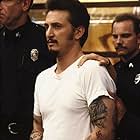A nun, while comforting a convicted killer on death row, empathizes with both the killer and his victim's families.A nun, while comforting a convicted killer on death row, empathizes with both the killer and his victim's families.A nun, while comforting a convicted killer on death row, empathizes with both the killer and his victim's families.
- Won 1 Oscar
- 23 wins & 24 nominations total
- Director
- Writers
- All cast & crew
- Production, box office & more at IMDbPro
Storyline
Did you know
- TriviaHelen Prejean: The real Sister Helen appears outside the prison during a candlelight vigil scene.
- GoofsThe chemicals used in lethal injections in Louisiana are administered manually, not by a machine as in the movie.
- Quotes
Prison Guard: Tell me something, Sister. What is a nun doing in a place like this? Shouldn't you be teaching children? Do you know what this man has done? How he killed them kids?
Sister Helen Prejean: What he was involved with was evil. I don't condone it. I just don't see the sense of killing people to say killing people's wrong.
Prison Guard: You know how the Bible says "an eye for an eye."
Sister Helen Prejean: You know what else the Bible asks for? Death as a punishment for adultery, prostitution, homosexuality, trespass upon sacred ground, profaning the Sabbath, and contempt of parents.
Prison Guard: I ain't gonna get into no Bible quoting with no nun, 'cause I'm gonna lose.
- Crazy creditsIn the heart-shaped symbol at the end of the credits, the initials EMLA, JHR, MGR, and SS stand for Tim Robbins' family with Susan Sarandon (SS) -- Jack Henry Robbins and Miles Guthrie Robbins (their two sons together) and Eva Maria Livia Amurri (Sarandon's daughter with Franco Amurri).
- SoundtracksThe Face of Love
Performed by Nusrat Fateh Ali Khan with Eddie Vedder
Written by David Robbins, Tim Robbins & Nusrat Fateh Ali Khan
Nusrat Fateh Ali Khan courtesy of Real World Records, Ltd.
Eddie Vedder courtesy of Epic Records
- tfrizzell
- Jun 26, 2000
Details
Box office
- Budget
- $11,000,000 (estimated)
- Gross US & Canada
- $39,363,635
- Opening weekend US & Canada
- $118,266
- Jan 1, 1996
- Gross worldwide
- $39,363,635
- Runtime2 hours 2 minutes
- Color
- Sound mix
- Aspect ratio
- 1.85 : 1
Contribute to this page

































